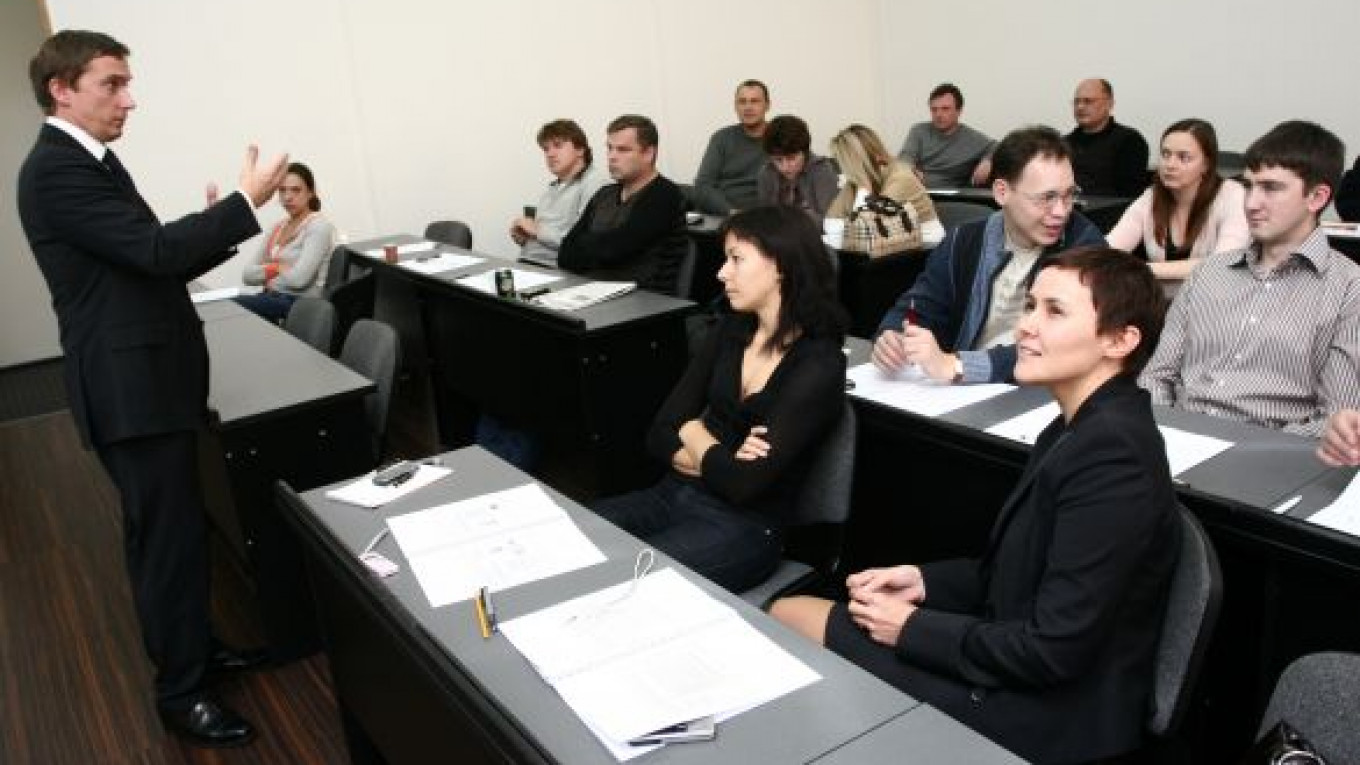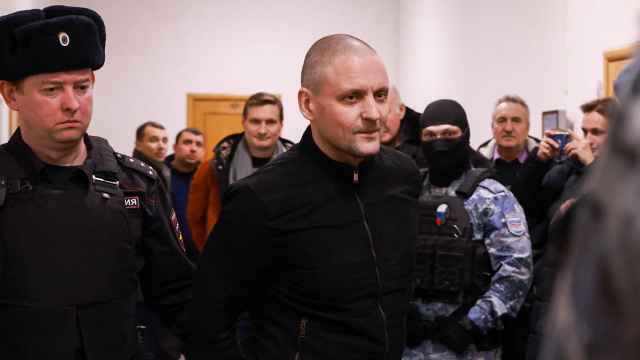Corporate expenditures on educating personnel have returned to pre-crisis levels, but that doesn't mean that companies are now ready to buy everything at once. Businesses continue to search out the most effective ways to raise the qualification and enthusiasm of their employees.
The latest Training Index study conducted by the Malakut group of companies found that budgets for education and development returned to pre-crisis levels in 2011, reaching the magic indicator of 2 percent of the total salary fund, said Yekaterina Klestova-Nadeyeva, the director of Training Index. In 2010, these expenditures made up 1.15 percent of the total salary fund.
Meanwhile, the percentage of a company's revenues allocated to education and development hasn't changed much: In 2001, this figure was 0.1 percent versus 0.09 percent in 2010.
According to the study's results, the majority of companies increased their education budgets in 2012. Moreover, not one company was expecting to reduce them in 2013. And while the median cost of education for top managers in 2011 grew 9 percent in comparison to the previous year, reaching 120,000 rubles ($4,000), the expenditures on midlevel management shot up 57 percent to 91,000 rubles. Expenditures on lower management increased 97 percent to 70,000 rubles, and those on specialists rose 178 percent to 55,500 rubles.
HR departments have started to feel more confident as interest in corporate education continues to grow in 2012, Klestova-Nadeyeva said.
Companies and educational service providers surveyed by Vedomosti corroborated the growth in demand for corporate education. This demand is driven first by stiff competition, secondly by companies' efforts to dominate new markets and thirdly by the desire to motivate the most talented and effective employees' career growth and allegiance to the company, said Margarita Perepelitsa, director of international MBA programs at the Russian Presidential Academy of National Economy and Public Administration.
Most companies understand that one system of bonuses, along with a company's brand, are no longer enough to ensure the loyalty of employees and their involvement in the work process, said Irina Gaida, partner and managing director at Boston Consulting Group Moscow.
Job-seekers now are less focused on the possibility for promotions, said Sergei Arzamastsev, HR manager at Pfizer.
"Now, potential employees include in their understanding of career growth not so much the achievement of new positions as the achievement of new experiences and personal and professional growth," Arzamastsev said.
Old Hands Teach Greenhorns
Training courses on a certain subject that all employees attend together are becoming a thing of the past. Now companies arrange training for a clearly defined group of employees according to their specific needs, Gaida said.
Boston Consulting Group looks favorably on having the company's senior partners and other leaders participate in training sessions for new hires and young employees, Gaida added.
"Who better than a director … can offer participants interesting and useful examples that allow them to apply the content of their training in a concrete situation?" she said.
Moreover, such training helps create informal connections between newcomers and the company's leadership, Gaida said. By diminishing the distance between directors and their subordinates, it's possible to make the decision-making process more effective, she explained. Such training also helps directors learn to better develop personnel, she said.
Back to School
In the past several years, large companies, spurred on by the crisis, started to move away from outside providers and create their own corporate universities, said Vsevolod Krylov, director for development at Stockholm School of Economics Russia. Programs themselves were shortened and shifted toward a training-session format.
Now demand for business-education programs from outside providers is gradually increasing, even though it's understood that a serious business program will cost more than a training session, Krylov explained. Companies send their employees to a serious program mainly with the intent of retaining high-quality managers or promising employees, he said.
Today, the market for corporate programs is seeing sharp growth, said Dmitry Volkov, director of MBA programs at the St. Petersburg State University Higher School of Management. After the crisis, many large companies realized the necessity of raising the business's management and functional effectiveness, he explained. Demand is growing for programs on functional management dedicated to such relevant topics as operational effectiveness of a business, orientation on clients, project management and modern operational management and logistics. It is also growing for programs on strategic management and leadership designed to prepare managers, Volkov said.
RusAl has been cooperating with the Moscow State University Higher School of Business's MBA program on production systems since 2007, when 10 people were enrolled. In 2011, 10 students graduated from the program, and currently 18 employees of RusAl and other companies in the Basic Element group are studying there. Another 12 students are to be enrolled this fall, a RusAl spokesperson told Vedomosti. The program lasts one calendar year, including exams, internships and time for individual study that total 1,000 hours of academic instruction. The bulk of the internships were realized at the automaker GAZ, as well as at RusAl's aluminum factory in Bratsk.
EMBA, MBA and re-specialization programs are interesting first and foremost to large businesses, which remain the main buyer on the corporate education market, Perepelitsa said. The interests of medium business are more often limited to programs such as mini-MBA and short-term modules.
"But experience shows that the best corporate programs are created through a dialogue between the client and the provider, when the client, forming his goals, reveals weak spots and problem issues in the professional preparation of employees that hinder the achievement of the company's strategic goals," Perepelitsa said.
Teachers Needed
In 2011, outsourcing of corporate education services increased, showing renewed interest in outside providers, Klestova-Nadeyeva said. This trend will continue in 2012 and 2013, she predicted.
Nevertheless, the balance between outsourced training and instruction within the company will stay about the same as in the post-crisis years: Companies will buy what they can't organize with their own resources, but the most essential education will be done within the company. Outside providers will be actively recruited to train top managers and, in some cases, midlevel managers, since raising the qualification level of these people requires outside expertise, Klestova-Nadeyeva said.
Overall, the approach to actual instruction has changed somewhat, and companies are combining virtual instruction with instruction in the classroom and the workplace. Play-acting instruction methods such as simulations are becoming more and more popular, Klestova-Nadeyeva said.
"On the whole there's a mixing of the instruction of the team with that of the individual employee," she said.
In addition, a few Russian companies have followed the example of their foreign counterparts and started to use "m-learning" (mobile learning, or instruction by mobile phone). Leadership and management skills are highly demanded instruction topics. Programs related to the talent pool and preserving the consistency of operations are also once again popular.
At the same time, businesses are trying to transition to more economical methods of instruction, such as instruction in the workplace. In 2011, hours of classroom instruction decreased for all personnel categories, according to the Training Index results.
KIT Finance both outsources and educates within the company: Employees attend seminars and courses to raise their qualifications, personnel development specialist Yelena Bobrova told Vedomosti. Often instruction within the company, including studying the experience of senior highly qualified employees, taking electronic courses and preparing with methodical textbooks, is more useful for new employees, she said.
However, outsourced education allows a company to raise an employee's motivation, since the company demonstrates its readiness to invest in personnel development, said Yelena Kolkova, director of the St. Petersburg filial of recruiting agency Staffwell.
Boston Consulting Group combines several forms of training, according to Gaida. For instance, the company conducts its own training to develop competence in presentation and persuasion, but also hires professional actors or directors to help staff act out critical moments.
"In the early stages of recruitment, consultants are selected for their analytical skills and haven't necessarily worked since childhood on the art of oration or the requisite showmanship," Gaida said. "Here the advice and instructions of a director are very useful."
The group brings in its clients, too.
"Clients ... appraise the presentations of our colleagues and say immediately how they saw that person during his presentation and what they would advise him to change in order to make his arguments convincing to them," Gaida said.
Despite the range of educational strategies and tactics, one thing is clear: Having unfrozen their budgets, companies are willing to spend some money and continue to work on the effectiveness of different educational programs, as well as on their whole system of instruction and development, Klestova-Nadeyeva said.
A Message from The Moscow Times:
Dear readers,
We are facing unprecedented challenges. Russia's Prosecutor General's Office has designated The Moscow Times as an "undesirable" organization, criminalizing our work and putting our staff at risk of prosecution. This follows our earlier unjust labeling as a "foreign agent."
These actions are direct attempts to silence independent journalism in Russia. The authorities claim our work "discredits the decisions of the Russian leadership." We see things differently: we strive to provide accurate, unbiased reporting on Russia.
We, the journalists of The Moscow Times, refuse to be silenced. But to continue our work, we need your help.
Your support, no matter how small, makes a world of difference. If you can, please support us monthly starting from just $2. It's quick to set up, and every contribution makes a significant impact.
By supporting The Moscow Times, you're defending open, independent journalism in the face of repression. Thank you for standing with us.
Remind me later.






